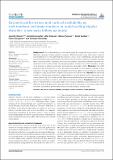Saccadic performance and cortical excitability as trait-markers and state-markers in rapid-cycling bipolar disorder: a 2-case follow-up study

Auteur, co-auteurs
Type de référence
Date
2013Langue de la référence
AnglaisEntité(s) de recherche
Psychology and NeuroCognition Laboratory, Grenoble, France
Résumé
The understanding of physiopathology and cognitive impairments in mood disorders requires finding objective markers. Mood disorders have often been linked to hypometabolism in the prefrontal dorsolateral cortex, and to GABAergic and glutamatergic neurotransmission dysfunction.The present study aimed to discover whether saccadic tasks (involving DPLFC activity), and cortical excitability (involving GABA/Glutamate neurotransmission) could provide neuropsychophysical markers for mood disorders, and/or of its phases, in patients with rapid cycling bipolar disorders (rcBD). Methods: Two rcBD patients were followed for a cycle, and were compared to nine healthy controls. A saccade task, mixing prosaccades, antisaccades, and nosaccades, and an evaluation of cortical excitability using transcranial magnetic stimulation were performed. Results:We observed a deficit in antisaccade in patients independently of thymic phase, and in nosaccade in the manic phase only. Cortical excitability data revealed global intracortical deficits in all phases, switching according to cerebral hemisphere and thymic phase. Conclusion: Specific patterns of performance in saccade tasks and cortical excitability could characterize mood disorders (trait-markers) and its phases (state-markers). Moreover, a functional relationship between oculometric performance and cortical excitability is discussed.Titre du périodique
Frontiers in PsychiatryMaison d’édition
Frontiers Research FoundationPays d'édition
Suissee-ISSN
1664-0640Evaluation par les pairs (peer reviewing)
ouiVolume / tome
3Pagination
1-9URL permanente ORFEE
http://hdl.handle.net/20.500.12162/5139Document(s) associé(s) à la référence
Texte intégral :
Fichier
Accès
Commentaire
Version
Taille
- Tout ORFEE
- Détail référence



